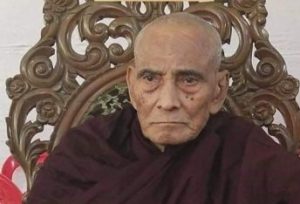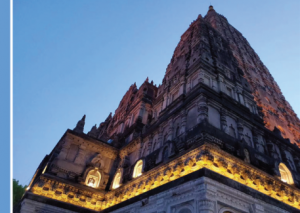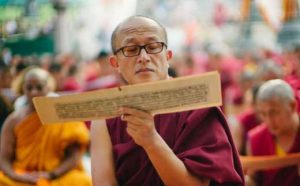
In his exegesis on the Deep Mind (the second of the Three States of Mind) in the Commentary on the Contemplation Sutra, Master Shandao explains:
One Buddha is the same as all Buddhas in terms of knowledge, interpretation and practices, enlightenment and accomplishment, the state of fruition, the great compassion, without the slightest differences. Thus, what one Buddha adopts is the same as what all Buddhas adopt. For example, if the previous Buddhas adopt the abolition of killing and the Ten Evil Actions, when there are future Buddhas born, how can they reverse the previous Ten Virtues and instruct beings to perform the Ten Evils?
By deducing this principle, one should clearly know that the words and actions [of all Buddhas] will not contradict each other.
The Commentary reiterates that a Pure Land practitioner should establish his faith in Amitabha’s deliverance in context of a Buddha, not in the context of any other kind of beings in the nine realms, including arhats, pratyekabuddhas, and bodhisattvas of any kind. Moreover, the teachings of all Buddhas are common and consistent in meaning.
If a person finds there are any words (in theory) and actions (practices) in the sutras that seem to be conflicting with each other, they must find out what is wrong with their understanding, not what is wrong with the Buddhas. It is because one should clearly know that the words and actions of all Buddhas will not contradict each other.
One Buddha’s teaching is the teaching of all Buddhas
Master Shandao further writes:
Though Shakyamuni Buddha, as one single Buddha, praises that all ordinary beings exclusively reciting Amitabha’s name for the remainder of their life will be reborn in Amitabha’s Pure Land after their death in this life, all Buddhas in the Ten Directions will praise the same, urge the same, and endorse the same. Why? They are of the same substance in great compassion. One Buddha’s teaching is the teaching of all Buddhas, and all the Buddhas’ teachings are shared by a single Buddha.
This is exactly what happens in the Amitabha Sutra. All Buddhas in the Ten Directions know that Amitabha Buddha has accomplished the 17th Vow: If, when I attain Buddhahood, innumerable Buddhas in the lands of the Ten Quarters should not all praise and glorify my Name, may I not attain perfect Enlightenment. So, they have no hesitation to praise and glorify his Name.
All Buddhas in the Ten Directions unanimously praise the same, urge the same, and endorse the same thing that Shakyamuni Buddha proclaims, “All ordinary beings exclusively recite Amitabha’s name for the remainder of their life will be reborn in Amitabha’s Pure Land after their death in this life. “
It is necessary for such an endorsement because Amitabha’s teaching of deliverance is extremely difficult to believe. Some Pure Land aspirants may overthink that other Buddhas and bodhisattvas may be unhappy if they exclusively recite Amitabha’s name, and not recite other Buddhas’ names.
For the sake of rebirth in Amitabha’s Pure Land, it is obvious that one should recite Amitabha’s name, rather than the name of any other Buddhas, as it is the most direct and straightforward way, even though the Buddhas are equal in power, wisdom, and merits.
All Buddhas unanimously extol Amitabha’s Name
So, Master Shandao illustrates his statement with reference to the Amitabha Sutra, and writes:
In the Amitabha Sutra, “Shakyamuni praises all splendor of the Land of Bliss, and urge all ordinary beings to exclusively and single-mindedly recite Amitabha’s name for one day to seven days, so that their rebirth is assured.
Next paragraph below: all Buddhas as many as sands in the Ganges in the Ten Directions unanimously extol Shakyamuni who can praise Amitabha’s name and urges them to recite for assured rebirth in the world with the Fivefold Turbidity. This is the evil world during an evil time with evil sentient beings, evil views, evil afflictions, evil wickedness, and lack of faith. This serves as the proof.
This is the sutra-based evidence that rebirth by exclusive Amitabha-recitation is the common consensus of all Buddhas. None of the Buddhas has any ill feeling if an Amitabha-reciter aspires to be reborn in Amitabha’s Pure Land by exclusively reciting Amitabha’s name.
It seems the statement is made repeatedly several times in the Amitabha Sutra. Why? The Buddhas are afraid that sentient beings are doubtful and do not believe what Shakyamuni says, who is just one Buddha. Master Shandao continues to write:
Moreover, the Buddhas in the Ten Directions are afraid that sentient beings do not believe what Shaykamuni, just one Buddha, says, so they extend their long, broad tongues and, encompassing with them the universe of a thousand million worlds, with the same mind at the same time together, pronounce these words of truth, “You sentient beings should believe what Shakyamuni Buddha says, praises, and verifies:
For all ordinary beings, regardless of their magnitude of blessings or offenses, regardless of the length of time [of the practice], if only they can single-mindedly and exclusively recite Amitabha’s name for their extended life up to a hundred years, or near death leaving one day to seven days only, they will be reborn with no doubt at all.
That is the reason why all Buddhas unanimously verify the matter that one Buddha speaks of. It is known as “faith established in context of person.”
In the Amitabha Sutra, the words of truth pronounced by all Buddhas is not explicitly expressed. Here, Master Shandao clearly declares the most astonishing and difficult-to-believe words of truth. I have to repeat it:
For all ordinary beings, regardless of their magnitude of blessings or offenses, regardless of the length of time [of the practice], if only they can single-mindedly and exclusively recite Amitabha’s name for their extended life up to a hundred years, or near death leaving one day to seven days only, they will be reborn with no doubt at all.
As a Pure Land aspirant, I have nothing to say at this point, and simply utter: Namo Amituofo!











